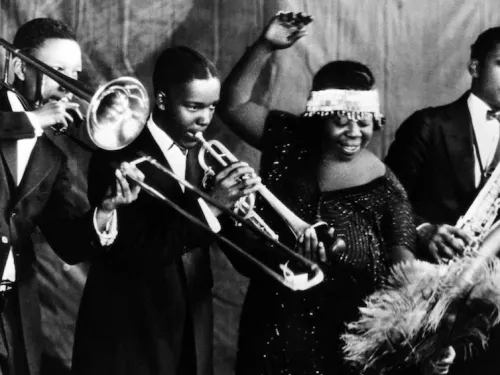Today’s Black History Month iconic lense shines on Gertrude “Ma” Rainey, often hailed as the “Mother of the Blues,” who was more than just a musical trailblazer. She was a cultural icon who defied societal norms and paved the way for future generations of artists.
With her powerful voice, flamboyant style, and unapologetic authenticity, Rainey not only shaped the sound of the blues but also used her music to celebrate her identity as a queer woman in an era of rigid conformity.
Gertrude Pridgett, born in Columbus, Georgia, was the second of five siblings in the family of Thomas and Ella Pridgett, both originally from Alabama. Her parents participated in minstrel performances, which played a key role in sparking Gertrude’s passion for the entertainment industry. She began her stage career at just 14 with a song and dance group.
Little is known about her early years, but Rainey stated that she started performing on the vaudeville circuit around 1900 — a daring decision for a young Black woman then. According to Rainey, during this period, she first encountered the style she would later refer to as the blues. At a concert hall in Missouri 1902, she listened to a singer deliver a mournful song about a failed relationship. Rainey convinced the woman to teach her the music, and from that moment, she incorporated the sorrowful style into her own performances.

In February 1904, at 18, she wed William “Pa” Rainey and began performing alongside him. She took on the name “Ma” to match his stage persona, and the duo was frequently advertised as Rainey and Rainey, Assassinators of the Blues. They performed together for over ten years, touring with numerous notable musicians, including the Rabbit Foot Minstrels. When the couple separated in 1916, Rainey established her own touring company: Madame Gertrude Ma Rainey and Her Georgia Smart Set. In 1923, she was discovered by producer J. Mayo Williams and signed with Paramount Records. Over her five-year tenure with Paramount, she recorded 92 records, including “Ma Rainey’s Black Bottom,” “Bad Luck Blues,” and “See, See Rider.”
Despite her many achievements, Rainey also led a fascinating personal life. She frequently hinted at her sexual experiences with women and was a regular at A’Leila Walker’s, Madam C.J. Walker’s daughter, renowned queer gatherings. In 1925, she faced arrest for hosting an all-women’s “indecent party.” It is believed that Bessie Smith, a notable queer woman and singer she personally guided, bailed her out. Smith would eventually be celebrated as the “Queen of the Blues.”

Although numerous narratives about her life overlook her bisexuality or homosexuality, Ma Rainey boldly conveyed her emotions through her songwriting. Given that blues culture thrived underground and was deemed “the devil’s music,” artists within the genre enjoyed greater freedom to address cultural taboos.
In her songs, she frequently references “B.D. women” (bull dagger or bull dyke) and “sissy men.” She even produced “Sissy Blues,” a track reflecting on her husband leaving her for another man, whom she refers to as “Miss Kate.”
As we celebrate Gertrude “Ma” Rainey’s legacy, we honor the woman who gave us the lesbian anthem “Prove It On Me Blues” and forever changed the landscape of American music.
